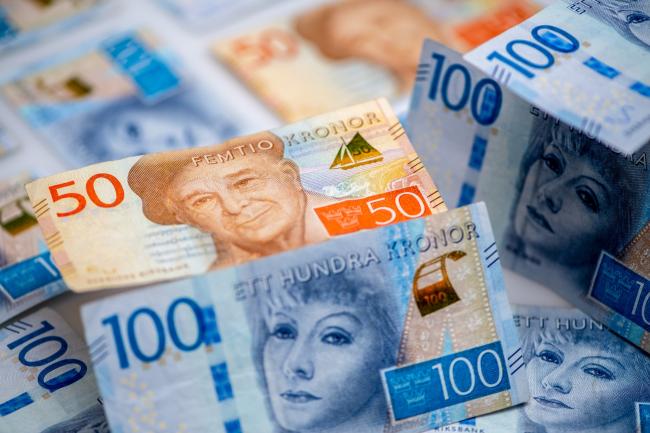(Bloomberg) -- Sweden’s krona is so weak that some of the biggest Nordic banks say policy makers may take action to prop it up.
The krona is the worst major currency this year, trading near the lowest since the global credit crunch in 2009, even though the Riksbank has started to lift its crisis-era stimulus. SEB AB and Nordea Bank Abp believe policy makers concerned about volatility and the impact on inflation may step in to intervene verbally if it slips further to approach a nine-year low of 11 per euro.
“It’s a matter of confidence. The currency is after all a signal about the state of the economy,” said Carl Hammer, head of currency research at SEB, Sweden’s biggest bank by market value. “It was clear that the Riksbank wasn’t happy with the situation the last time there was a slide toward these levels.”
Riksbank Deputy Governor Henry Ohlsson said Thursday that the krona was surprisingly weak, echoing comments from fellow Deputy Governor Martin Floden at the central bank’s policy meeting last month. Floden suggested that a weaker currency could be a factor to call for another rate increase in April, according to the meeting’s minutes.
The krona’s direction this year is indeed more in line with Haiti’s gourde than the gains of most of its Group-of-10 peers, confounding predictions by strategists that it would be the best performer after Sweden initiated a hiking cycle in December. The Riksbank has cut its forecast for the currency and the krona is still about 4 percent weaker than the central bank’s view, as measured by an effective exchange rate index.
The drop is partly explained by traders pushing back bets for further interest-rate hikes from the Riksbank this year as global central banks slow down monetary tightening plans given sluggish world growth.
The krona is trading around 10.52 per euro, having fallen nearly 4 percent in 2019 to add to a 13-percent slide in the past three years. But so far, the currency selloff has failed to spur inflation, with price growth dipping below the bank’s 2 percent target in February, and inflation expectations weakening.
While the Riksbank has in recent years frequently warned of the threat of any rapid appreciation of the krona and its impact on inflation, many board members also commented on the currency’s weakness last April after it depreciated in the months leading up to that meeting. It intervened to strengthen the krona in 2001, when it was worried about imported inflation.
“The Riksbank has sacrificed the krona to get inflation back to target, but there are limits to that too, and a too weak and too volatile currency isn’t good for the economy,” said Nordea’s chief analyst Torbjorn Isaksson. “They may initially say that they’re not comfortable with it and that they don’t understand it. And they can add other measures later.”
Still, the currency won’t necessarily continue to test the central bank’s patience. A one-standard deviation model based on options suggests there is less than a 2 percent chance the pair trades above 11 per euro in a month’s time. Nordea pointed to a turn in the country’s economic surprise index, suggesting the krona could rebound to 10.40 toward the end of this month.
Svenska Handelsbanken AB, Sweden’s biggest lender by assets, thinks it’s not krona weakness per se that would make the Riksbank react, but rather the currency’s effect on the inflation outlook. Any move to levels that are too far off from the krona’s fundamental value could set the stage for a fast and volatile rally.
“It makes the central bank’s job harder as a volatile exchange rate makes it more difficult to predict the impact on the real economy from its own policy changes,” said economist Johan Lof.
